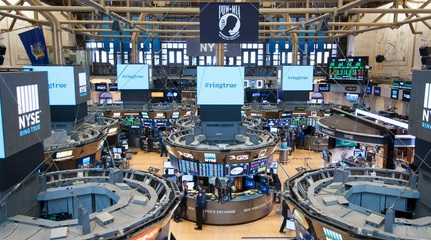
NEW YORK (AP) — Technology stocks powered solid gains for Wall Street on Friday after another chipmaker reported strong demand related to artificial intelligence.
The upbeat finish to the week for major indexes comes amid lingering anxiety over persistently high inflation, the risk of a U.S. debt default and broadly weak corporate earnings.
The S&P 500 rose, 54.17 points, or 1.3% to close at 4,205.45. It notched a small gain for the week and is in the green as May nears its close.
The Dow Jones Industrial Average rose 328.69 points, or 1%, to 33,093.34.
The tech-heavy Nasdaq notched the biggest gains, rising 277.59 points, or 2.2%, to 12,975.69. The index rose 2.5% for the week as artificial intelligence became a big focus for investors.
Marvell Technology surged a record-setting 32.4% after the chipmaker said it expects AI revenue in fiscal 2024 to at least double from the prior year. That follows Thursday’s report from fellow chipmaker Nvidia, which gave a big forecast for upcoming sales related to AI.
The revolutionary AI field has become a hot issue. Critics warn that it is a potential bubble, but supporters supporters say it could be the latest revolution to reshape the global economy. The nation’s financial watchdog, the Consumer Finance Protection Bureau, said it’s working to ensure that companies follow the law when they’re using AI.
Wall Street remains focused on Washington and ongoing negotiations for a deal to lift the U.S. government’s debt ceiling and avert a potentially calamitous default.
Officials said President Joe Biden and House Speaker Kevin McCarthy were narrowing in on a two-year budget deal that could open the door to lifting the nation’s debt ceiling. The Democratic president and Republican speaker hope to strike a budget compromise this weekend.
Wall Street and the broader economy already had a full roster of concerns before the threat of the U.S. defaulting on its debt became sharply highlighted on the list.
“Should we avoid that, and it appears that is a high probability, we come back to a trajectory of a slowing economy, still-too-high inflation and restrictive monetary policy,” said Bill Northey, senior investment director at U.S. Bank Wealth Management.
A key measure of inflation that is closely watched by the Federal Reserve ticked higher than economists expected in April.
The persistent pressure from inflation complicates the Fed’s fight against high prices. The central bank has been aggressively raising interest rates since 2022, but recently signaled it will likely forgo a rate hike when it meets in mid-June. The latest government report on inflation is raising concerns about the Fed’s next move.
Wall Street is now leaning slightly toward the potential for another quarter-point rate hike in June, according to CME’s Fedwatch tool. The Fed has already raised its benchmark interest rate 10 times in a row.
The Fed faces a difficult choice at its next meeting, wrote Brian Rose, senior US economist at UBS, in a report.
“Inflation is too high but further rate hikes could push the economy into recession,” he said.
Bond yields had been slipping just prior to the latest inflation data, but rose following the report. The yield on the 10-year Treasury, which helps set rates for mortgages and other important loans, rose to 3.80% from 3.78% just before the report was released.
Movement for the two-year Treasury yield, which tends to track expectations for Fed action, was more forceful. It jumped to 4.56% from 4.49% prior to the report.
The latest inflation data also highlighted the continued resilience of consumer spending, which has been a key bulwark, along with the strong jobs market, against a recession. The economy grew at a sluggish 1.3% annual rate from January through March and it is projected to accelerate to a 2% pace in the current April-June quarter.
The impact from inflation and worries about a recession on the horizon have been hitting corporate profits and forecasts. The latest round of company earnings is nearing a close with the profits for companies in the S&P 500 contracting about 2%. That follows a previous quarterly contraction and Wall Street expects the current quarter to end with more shrinking profits.
Beauty products company Ulta Beauty fell 13.4% after trimming its forecast for profit margins. Discount retailer Big Lots fell 13.3% after reporting a much bigger loss last quarter than analysts expected.
Investors rewarded several companies that reported strong financial results. Gap rose 12.4% after reporting a strong first-quarter profit.
Markets are heading into a long weekend and will be closed in the U.S. for the Memorial Day holiday on Monday. Investors have another busy week of economic updates ahead, including more data on consumer confidence and employment.




